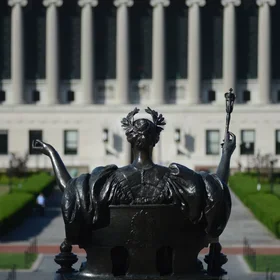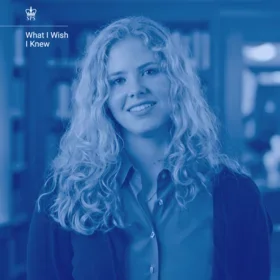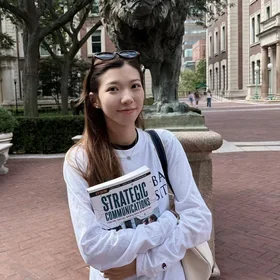Matthew Ostrander, ’21SPS, Executive Technology Management, is the Director of Technology Strategy and Transition at Imagine One Technology & Management, Ltd in Charleston, South Carolina. He will defend his final thesis project, a startup venture that has recently been accepted by an accelerator in Charleston, at his residency on campus this fall.
What led you to pursue the executive master's degree from Columbia?
I wanted to accelerate my career and move to the executive ranks. My thinking was that an executive MBA or something along those lines would provide me with the knowledge, skills, and experience to perform as an executive. As I started looking at options in late 2018 and early 2019, I was particularly drawn to programs that focused on technical leadership. The factors that I think distinguished Columbia the most were the mentorship program and access to leaders in technology.
Tell us about your career journey. How has the program helped you to define your career journey? Have your aspirations or professional goals changed in any way due to the program?
My career has taken me from starting as an Officer in the U.S. Air Force to consulting in the private sector. Along the way, I have had a wide range of experiences within technology and have had a similarly broad range of training and education. My undergraduate degree is in mechanical engineering, my first master's degree is in manufacturing engineering, I have software development experience, I have analytical experience, and I have experience manufacturing hardware. The broad exposure to myriad industries has served me well, but this program has enabled me to narrow my focus to moving into the C-Suite in technology. As I commenced with the program, that was and remains a goal.
I did not anticipate, however, the fact that I might consider a startup as a result of the thesis project. As it turns out, I am doing just that. I am beginning work on my startup, Veracity Tree, and have been admitted to an accelerator program that begins in September. My professional options have been vastly improved since being admitted to the program.
Have any courses or faculty members helped you to hone key skills?
This question is so hard to answer. All courses have been tremendously impactful in shaping how I think about management. Strategic Advocacy did a lot to help me understand political savvy in an organization in a way that I never had in my career. I have a set of tools that will enable me to navigate the informal networks in organizations. I liken it to once having blinders on and now having those removed and grasping a dimension of the professional environment of which I was frankly ignorant.
Are you applying what you are learning at Imagine One?
I am absolutely applying much of what I am learning at Columbia. I was recently promoted to Director of Technology Strategy and Transition. I used much of what I have learned to earn that position. The role had never existed at the company before, and I was able to present the concept and convince them to hire me for the role. I learned of the “51% rule” in my Strategic Advocacy class. The idea is, when pitching a new concept, always secure an advocate who is at least willing to speak with you about it, then grow from there. Always know that at least 51% of the people in the room are willing to lend an ear. I used this technique to pitch and win favor for the new position.
Now that I am in the position, I will use everything that I have been taught in this program as I seek to align Imagine One's technology competency to the customer problem space.
Tell us about your mentorship. Who was your mentor and what was it like learning from him/her?
My mentor is Dr. Stephen Mills. He is the Global CIO at iHeartMedia. Dr. Mills has been fantastic. He is so accessible and has enthusiastically supported my work. He has immediate, relevant insights that I can adopt to improve my presentations and concepts. I tend to get long-winded and he has helped me understand what to keep and what to remove, and really how to get immediately to the point. This is one of the essential aspects of interacting with an executive such as Dr. Mills. He lives this every day, so he knows what works and what doesn't.
Walk us through the process of your master's project. What problem were you aiming to solve?
I like to start with a quotation from over two hundred years ago: "...were it left to me to decide whether we should have a government without newspapers or newspapers without a government, I should not hesitate a moment to prefer the latter." In this quotation, Jefferson highlights the importance of the news media, and it remains as essential today as ever. There is a crisis in the news media, and Veracity Tree, I believe, is an answer to the problem. Veracity Tree is an automated news app that summarizes multiple articles using cutting-edge natural language processing technology. It enables a fast, comprehensive understanding of the news. It eliminates bias and helps the reader understand issues completely without sifting through all of the information on the internet.
I believe three powerful entities, the news media, politicians, and "big tech" (I call them the unwitting triumvirate), stoke tribalism for their benefit and treat their constituents as resources rather than customers. Veracity Tree would instead be a resource to its customers to enable independent thinking and balanced views.
I have been very well prepared for my thesis pitches because of the mentor support. Dr. Mills taught me to be more concise, to know what to present and what to not present--we have to cut the pitch down to one slide in our final defense. My cohort has also been fantastic in helping one another prepare. We all meet online regularly, and whoever wants to present that day presents, and we critique one another.
Another beneficial concept I have been applying is the idea of establishing a board of advisors for the thesis. I’ve tapped some people in my life--a contact of one of my cohort members, who understands the AI space; a local contact in Charleston, who understands the VC space; a friend from my cohort, who is a financial expert; and of course, my mentor Dr. Mills. This group of people has been crucial in allowing me to turn my original idea into a reality.
What advice do you have for future students who want to succeed in leadership roles in the tech industry?
I wanted to say something like, "Continuously invest in your understanding of your craft. Seek to read and understand everything relevant to your domain and to executive leadership deeply." While that may be true, maybe the best advice I can give someone is to understand emotional intelligence and learn your blind spots. If one is in a position of technology leadership already, they have probably demonstrated the technical aptitude. The thing that will set you apart from others is your ability to work well and communicate with everyone in your circle. Emotional intelligence is the critical factor in ensuring one can do that.


